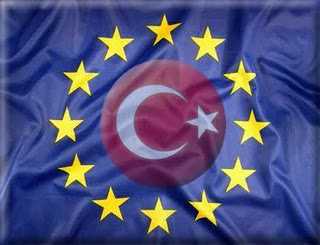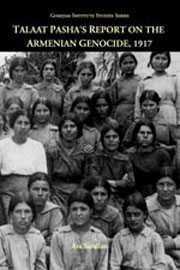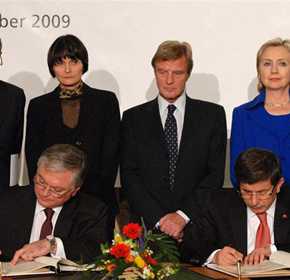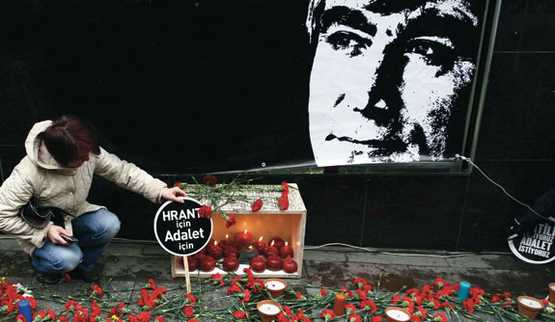 September 05, 2011 | 16:15
September 05, 2011 | 16:15
By Aram Gareginyan
Talks of Turkey and the EU over membership are still pending – but for Armenia it might as well be better otherwise. EU admission, long sought by Turkey, may impose certain guidelines in political behavior – particularly treating the Genocide issue. In an interview to Armenian News – NEWS.am, political analyst, head of the Center for Regional Studies, Richard Giragosyan, gives another possible scenario of Genocide recognition process – involvement of the Israeli lobby in Congress, in response to the expulsion of the Israeli ambassador to Ankara.
Do you think that the recent agreement between Turkey and the US on stationing NATO’s missile defense radar in the country could have repercussions on the relations between Turkey and Iran?
It could, but more interesting are the repercussions on the relations between Turkey and Russia. They have been moving closer together over energy, diplomacy, geopolitics for several years. Even on the Protocols Russia was generally supportive. This is the first time Turkey is doing something that Russia does not like. And for me it’s most interesting and significant because it is the first real test to see how deep and how strong the relationship between Russia and Turkey is. And we’re not sure what Russia will do. Because this is, in fact, the same missile defense plan involving Poland and Czech Republic, that Russia was so strongly against. From the Turkish perspective it’s interesting too, because despite the negative reaction from Russia, Turkey has decided to go further with this in order to bolster its own role in the region. Over the past two years Turkey was not acting in the interest of the United States – on Iran, in a deal with Brazil. Even with Armenia on the Protocols in was not an American plan. They didn’t brief the Americans, and the Americans were upset. Now this is the second time Turkey is moving in the direction of being an American ally again. The first one was Syria: Hilary Clinton went to Turkey, the Turkish foreign minister went to Syria. The interesting thing from the Turkish perspective is what price the Americans had to pay to get Turkey to agree. That we don’t know. It could be American cooperation, or abstaining from criticizing Turkey’s military attacks against Kurdish villages and positions in Northern Iraq.
So Iran is merely a pretext, and the move is directed against Russia?
Not in military terms, but politically – yes. Or it may be Turkey’s attempt to show Russia that Turkey is strong and important and may deserve more from Russia. That could be Turkey’s style of gamble. Regarding Iran, whether or not these defensive systems are in Turkey is less important, because Iran has no alternative but to try to use Turkey as a mediator or a broker, having limited options. What’s interesting from the Armenian perspective is there’s no statement or reaction. What Armenia should do is go to the European Union and say – we have good relations with Iran: let us help and advise you on European policy toward Iran or to be a neutral platform. In other words, Armenian foreign policy in this case shows more missed opportunities, because there’s no energy and no creativity in the Foreign Ministry.
Do you think the EU could heed to Armenian recommendations?
Definitely. In terms of either the Eastern partnership, or the EU foreign ministerial initiative. Armenia is the only country in the bigger region, in the whole Black sea region, that can play a constructive role. It’s the only country in the region that has good relations with Iran and the West. Turkey, for its own purposes, is playing a role. But Armenia, unlike Azerbaijan and Georgia, is the only neighbor of Iran that can be a messenger, or mediator.
Do you think that Russia possesses enough leverage to influence the political behavior of Turkey?
I think not too much of leverage. In many ways the relationship between Turkey and Russia in my opinion is a bad marriage; it’s not bound to last very long. They are historical and regional rivals. And there will come a point when Turkey and Russia begin to clash. The other thing that’s interesting is Turkey trying to promote itself as a bigger regional power, which also directly threatens Russian interests and power in the South Caucasus. In Armenian perspective this is probably a positive development, because the more problems between Russia and Turkey, the better for Armenia, in this context.
Do you regard the current signs of Islamisation of Turkish policy as a lasting trend?
Lasting as far as the AKP government is in power. Yes, it is an Islamist oriented government, but this is not just about Islam. This is about who wants to be stronger in the Middle East. The reason that Turkish-Israeli relations have declined so much, is that Turkey doesn’t see a need for Israel any more. And Turkey wants to win over the Arab masses, especially after the change of governments in Tunisia/Egypt, now possibly Libya/Syria. Now Turkey wants to emerge as the leader. Which is ironic, because, even under the Ottoman Empire, most of the Arabs in the region hated the Turks. They remember the Ottoman Empire, and the Genocide. But what’s interesting, is by being anti-Israeli, Turkey is being very populist in the Middle East. The other interesting thing is that Turkish government is using its problems with Israel as a way to weaken the Turkish military by cutting off military ties between the Turkish military and one of its key supporter, the Israelis. So it’s also about internal Turkish politics as well. From the Armenian perspective this greatly strengthens the Genocide issue. For many years the Israelis, because of the relationship with Turkey, have helped to sabotage or damage Genocide recognition efforts. Now the Israeli lobby in the United States and in Europe may actually turn around and support the Genocide issue to get revenge against Turkey. So in terms of Genocide recognition, this is a big change and a much more powerful development against Turkey and for Genocide recognition.
Do you think that the Genocide bill will finally get underway in Knesset?
It could, but my point is not just the Knesset, but the Congress. You will see the Genocide bill being seen no longer just an Armenian issue, but a convenient way for many of the Jewish lobby to use it as a stick to beat up Turkey. It’s not exactly a good reason for us pursuing Genocide recognition, but it will strengthen the campaign.
Do you view the Islamisation of Turkey just as an imitational move, or the government does plan to make the society more Islam-oriented?
It’s worth consideration. We don’t know yet whether it’s the AKP government, Islamist at its core, that is leading the Islamisation of Turkey, or it’s the population becoming more Islamic, and therefore the government is playing on that in terms of getting more power. In other words, the trend of Islamisation in Turkey could be from the bottom up, not necessarily top down. But it also changes the meaning of Islamic government. The trend of Turkey is not like the trend of Iran. This isn’t about establishing an Islamic state. This is about finding a way to be less secular and more democratic. But we’re not sure if Turkey will succeed. The other thing from an interesting Armenian perspective, since Turkey is on the border: the military, the secular reaction, the Ataturk camp against the Islamic government of Turkey. They haven’t lost yet. They may still be a powerful counter-reaction or even counterrevolution against the Turkish trend of Islamic politics. And Armenia should actually consider the different scenarios, and plan for the outcome of the battle for the future of Turkey. And I don’t think this has been thought of enough.
Do you think that moving off its secular policy may freeze talks of Turkey with EU over membership?
Perhaps I’m wrong, but over the past year and a half, even after meeting with Turkish officials in Turkey, my opinion is that the Turkish strategy has changed. It’s no longer begging to join the European Union. It’s much more now about making Turkey stronger, so that the European Union will need Turkey more than Turkey needs the European Union. That’s the danger, and that’s a new strategy. From the Armenian perspective, in the future, I would personally like to see Turkey in the European Union. Mainly because Turkey would be better as a neighbor and less dangerous within the straight jacket of the European Union. Because after joining the EU, Turkey would be much more accountable in treating Armenian issues, addressing the Genocide, historical legacies, property restitution. But most importantly, Turkey would also have to reduce is military, no longer be as aggressive or threatening either to Armenia or the Kurds, would have to play a different game with Azerbaijan. This would leave Turkey less room to maneuver to be a hostile neighbor. For that reason, Turkey within the European Union, and within a bigger European Union, may be a better neighbor to Armenia. This would also bring the EU borders to the Armenian border.
Military cooperation of US and Turkey has been uneven over the last decade. Why do you think the US still seek partnership?
What we see is for years or decades it was always the Pentagon, the US military that defended Turkey even when they shouldn’t have to, regarding the Genocide or relations with Armenia. And it was the State department who was pushing Turkey. Now it’s the opposite, it’s actually the Pentagon that is still upset with Turkey, and still no longer sees the need for Turkey. Now that the Americans are in Afghanistan, in Iraq, have a different role in the Middle East, they need Turkish military assistance much less than before. And even Turkey as a NATO member is a different Turkey. It sees the Black Sea not within the angle of NATO or cooperation with the US, but much more a Turkish sea, or in cooperation with Russia. So I think the military relation has changed dynamically, probably will never recover to what it was. And I think this is probably good for the region. Because for too long Turkey has been seen as a loyal NATO ally. But it wasn’t really loyal, and it wasn’t much of an ally, if we really analyze it.
What could you say of Turkey’ efforts to get a foothold at Balkans, manifested in recent statements of support to Bosnia by Davutoglu on his Balkan tour?
In fact, in general Turkish foreign policy, especially with Davutoglu, has prioritized the Balkans and the Turks rom the Balkans. But what’s interesting is the problem it demonstrates. In my opinion, the weakness of Turkish foreign policy is it’s over-extended. It doesn’t prioritize. It wants to be active in Syria, Libya, Iraq, Bosnia, Cyprus, Caucasus, Azerbaijan, Russia, Brazil and Iran, Sudan, North Korea – do all these things at once. And it’s much over-confident and over-extended. And this will be the downfall. If Turkey is trying all these initiatives in foreign policy, if it doesn’t give a 100 percent, it will fail in many attempts, rather than succeeding in fewer ones. This may actually bring Turkey back to the Armenian issue, because, according to many Turkish foreign ministry officials, they may return to the Armenian-Turkish border opening and diplomatic relations, the essence of the Protocols, because they are failing in other areas of foreign policy. And this one is maybe smaller and easier for them to accomplish, according to their thinking.
Do you think that the Protocols would be raised again in Turkish Parliament?
No. According to what I’m seeing as an analyst, the Protocols are dead, and will never come back. Not in Turkey, not in Armenia. What’s going on now in my opinion, is diplomacy of a much more limited nature to try to reach an agreement on the terms of the Protocols – border opening, diplomatic relations. But not on the Protocols themselves. Because Turkey realizes it made a strategic mistake with the Protocols in underestimating the Azerbaijan’s reaction. So I don’t think it will go back to them. From the Armenian side, it doesn’t make sense trying to resurrect the Protocols. Regarding the historical sub-commission issue, what’s good about the current situation, is it’s only about border opening and diplomatic relations first. There’s no more talk from the Turkish side, if you notice, about any sub-commission on the historical issues. So there’s less of danger of weakening or selling out Armenia’s defense of the Genocide issue.
 During a joint press conference with other writers, Sarafian responded to attacks by Turkish writers about the book.
During a joint press conference with other writers, Sarafian responded to attacks by Turkish writers about the book.




 September 05, 2011 | 16:15
September 05, 2011 | 16:15